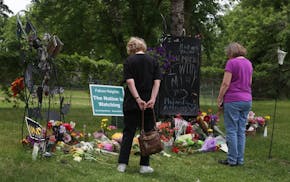Opponents of the proposed Southwest light-rail line are invoking the prose of Dr. Seuss to illustrate the harm they say the $1.77 billion transit project will inflict on the environment.
The Lakes and Parks Alliance (LPA), a local group that opposes the project, will hold a "Speak for the Trees" event on Saturday to protest the "destruction of 44 acres of Minneapolis urban forest" in the Kenilworth corridor, a popular bike and pedestrian thoroughfare.
The 14.5-mile line will link downtown Minneapolis to Eden Prairie beginning in 2020. The Alliance has sued the Metropolitan Council, claiming the regional planning body violated state and federal environmental laws in planning the project.
Saturday's event will take place behind 2512 Upton Av. S., beginning at 10:30 a.m. There will be an 11 a.m. reading of "The Lorax," the Dr. Seuss book that serves as a cautionary environmental tale. First published in 1971, the book chronicles the plight of the Lorax, a creature who speaks for the trees against the greedy Once-ler, who cut them down to make his product.
Green ribbons will be tied around trees to "dramatize the magnitude of the clear-cutting," according to the Alliance.
When asked to comment, Metro Transit officials say a design committee has been meeting since May to develop a long-term landscaping plan for the corridor. A recent survey of the area found 1,960 trees with a diameter of at least 6 inches, and 480 trees with trunks of at least a foot. The most common tree types include cottonwood, elm, and box elder — all considered native to the Twin Cities.
About 200 trees will be preserved, and 485 new ones planted once the transit line is built. The final design for the corridor will be presented at an open house on Nov. 18.
"The Met Council's plan to destroy Minneapolis' largest urban forest flies in the face of the urgent, worldwide movement to preserve trees," said George Puzak, an LPA board member. "Clear cutting of forests is known to contribute to global warming. We think the Met Council should choose a more environmentally friendly route for light rail."
jmmoore@startribune.com

Falcon Heights, St. Anthony move toward renewing police partnership severed after killing of Philando Castile
January assault on elderly man turns deadly, marking eighth homicide in St. Paul

Israel-Hamas war creates 'really fraught times' at Minn. colleges

Florian Chmielewski, former senator and Funtime Band accordion player, dies at 97

